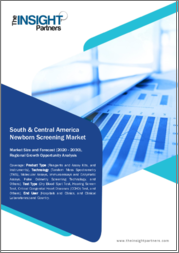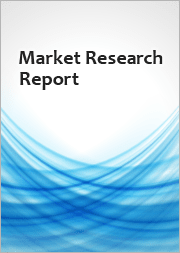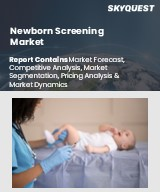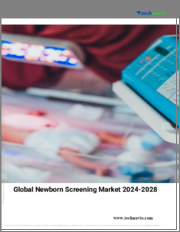
|
시장보고서
상품코드
1463684
중남미의 신생아 스크리닝 시장 전망(-2030년) : 지역별 분석 - 제품 유형, 기술, 검사 유형 및 최종 사용자별South & Central America Newborn Screening Market Forecast to 2030 - Regional Analysis - by Product Type (Reagents and Assay Kits, and Instruments), Technology, Test Type, and End User (Hospitals and Clinics, and Diagnostic Laboratories) |
||||||
중남미의 신생아 스크리닝 시장은 2022년 5,808만 달러로 평가되었습니다. 2030년에는 1억 64만 달러에 달할 것으로 예상되며, 2022-2030년간 연평균 7.1%의 성장률을 나타낼 전망입니다.
신생아 유전자 검사로 중남미의 신생아 선별 검사 시장 활성화
질병의 유전적 원인에 대한 지식이 깊어지고 의료 기술이 발전함에 따라 신생아에 대한 종합적인 유전자 검사에 대한 수요가 증가하고 있습니다. 이에 따라 신생아 스크리닝 시장의 기업들은 혁신적이고 비용 효율적인 선별검사 솔루션을 개발하고 있으며, 예스카르타와 진테글로(Zynteglo)는 대세포 B세포 림프종과 베타 지중해 빈혈에 대한 승인된 유전자 치료제의 두 가지 예입니다. 또한, 출생 시 질병에 대한 유전적 소인을 파악할 수 있는 기술의 출현은 개인 맞춤형 의료로 가는 길을 열어주며, 이는 정밀의료의 광범위한 추세와 일치합니다.
임신 중 유전성 질환에 대한 선별검사는 임신과 관련된 문제를 조기에 발견하는 데 중점을 두고 있습니다. 차세대 염기서열 분석기는 모든 염색체에서 다운증후군, 삼염색체 21번과 같은 이수성 및 부분적 염색체 이상(중복 및 결실)을 95% 이상의 민감도로 검출하여 신생아 산전 선별검사를 지원합니다. 형광 in-situ hybridization(FISH)은 겸상 적혈구 빈혈과 같은 단발성 질환을 검출하는 데 사용됩니다. 모체 혈장을 이용한 무세포 태아 DNA 접근법과 같은 비침습적 절차는 유전자 검사의 최근 발전입니다. 배아 DNA는 크기 차이로 인해 모체 DNA 조각과 구별할 수 있습니다. 형광 프로브를 이용한 실시간 PCR, 샷건 시퀀싱(Solexa 또는 Illumina) 또는 거대 표적 병렬 시퀀싱을 통해 태아의 질병과 관련된 DNA를 검사할 수 있습니다. 이러한 유형의 유전자 스크리닝이 더 연구되면, 의사는 특정 약리요법(약리유전학)을 통해 조기에 분자적 개입을 하거나 세포, 조직, 기관에 물리적, 화학적 변화를 줄 수 있게 될 것입니다. 이처럼 영아 유전질환 스크리닝 방법의 발전은 신생아 스크리닝 시장 전체에 엄청난 잠재력을 가지고 있습니다.
중남미의 신생아 스크리닝 시장 개요
중남미의 신생아 스크리닝 시장은 브라질, 아르헨티나, 기타 중남미로 구분됩니다. 중남미는 지리적 지역, 인구 통계, 경제, 사회, 사회, 민족, 신흥 경제 국가, 의료 시스템 등 다양한 20개 국가로 구성된 지역입니다. 브라질, 아르헨티나 및 기타 중남미 국가들은 고소득 국가에 비해 신생아 검진 프로그램 수가 상대적으로 적습니다. 이는 주로 경제적, 기술적, 물류적 제약과 각국의 사회적, 문화적, 정치적 배경의 차이에 기인합니다. 연방정부의 신생아 스크리닝(NBS) 프로그램에는 현재 선천성 갑상선기능저하증, 낭포성 섬유증, 갈락토스혈증 검사, 비오티니다제 결핍증, 선천성 부신과형성증 등 6가지 질환이 포함되어 있습니다. 또한, 이 지역의 신생아 스크리닝 프로그램과 역량은 지속적으로 개선되고 있습니다. 칠레, 코스타리카, 쿠바, 우루과이의 오랜 NBS 프로그램은 신생아의 99% 이상을 대상으로 하고 있습니다. 브라질, 멕시코, 아르헨티나의 프로그램은 검진 패널을 늘리고 있지만 교육, 후속 조치, 법률 제정 및 관리 개선이 필요합니다.
브라질은 2001년에 전국적인 NBS 프로그램을 시작하여 신생아의 80% 이상을 커버하는 참조 센터를 설립했습니다. 이 프로그램에는 페닐케톤뇨증, 선천성 갑상선기능저하증, 헤모글로빈병, 낭포성 섬유증, 선천성 부신과형성증, 비오티니다아제 결핍증 등 6가지 주요 질환이 포함됩니다. 브라질의 전국 신생아 검진 프로그램은 향후 몇 년동안 출생아의 100%를 검진하는 것을 목표로 하고 있습니다. 또한, 2021년 6월 브라질 정부 당국은 2021년 6월까지 모든 주에서 ENBS를 시행하도록 하는 법안을 통과시켰으며, 2022년 6월까지 모든 주에서 ENBS를 시행하도록 의무화했다, 리소좀병, 면역결핍증, 척수성 근위축증을 포함한 프로그램으로 단계적 확대가 예정되어 있습니다. 이처럼 최근 몇 년동안 새로운 프로그램 시행, 의료보험 적용 범위 확대, 새로운 NBS법 제정, 질병 패널 확대, 정부 및 공중보건 당국의 참여 강화 등을 통해 지속적인 성장을 보이고 있습니다. 치료를 촉진하고 환자의 건강 결과를 개선하기 위한 첫 번째 단계임을 입증하고 있습니다.
중남미의 신생아 스크리닝 시장 매출 및 2030년까지의 예측(금액)
중남미 신생아 검진 시장 세분화
중남미 신생아 검진 시장 세분화중남미의 신생아 스크리닝 시장은 제품 유형, 기술, 검사 유형, 최종 사용자, 국가별로 구분됩니다.
제품 유형에 따라 중남미의 신생아 스크리닝 시장은 시약 및 분석 키트와 기기로 양분됩니다. 시약 및 분석 키트 부문은 2022년 중남미의 신생아 선별 검사 시장에서 더 큰 점유율을 차지했습니다. 시약 및 분석 키트 분야는 DNA 기반 분석, 면역 분석, 효소 분석으로 세분화됩니다. 기기 부문은 신생아 장애 검사 기기, 맥박 산소 측정기, 신생아 청각 검사 기기 및 기타 기기로 세분화됩니다.
기술 측면에서 중남미의 신생아 스크리닝 시장은 탠덤 질량 분석(TMS), 분자 분석, 면역 분석 및 효소 분석, 맥박 산소 측정 선별검사 기술, 기타 기술로 분류됩니다. 맥박 산소 측정 검사 기술 부문은 2022년 남미 신생아 선별 검사 시장에서 가장 큰 점유율을 차지했습니다.
검사 유형에 따라 중남미의 신생아 선별 검사 시장은 건혈 반점 검사, 청력 검사, 중증 선천성 심장병(CCHD) 검사 및 기타 검사 유형으로 분류되며, 2022년 중남미의 신생아 선별 검사 시장 점유율은 건혈 반점 검사 분야가 가장 큰 시장 점유율을 차지했습니다. 가장 큰 시장 점유율을 차지할 것으로 예상됩니다.
최종 사용자별로 중남미의 신생아 스크리닝 시장은 병원 및 클리닉과 진단 실험실로 구분됩니다. 병원 및 클리닉 부문은 2022년 중남미 신생아 검진 시장에서 더 큰 점유율을 차지했습니다.
국가별로 중남미 신생아 검진 시장은 브라질, 아르헨티나, 기타 중남미로 분류됩니다. 브라질은 2022년 중남미 신생아 검진 시장을 독점했습니다.
Bio-Rad Laboratories Inc, Masimo Corp, Medtronic Plc, PerkinElmer Inc, Waters Corp는 중남미 신생아 검진 시장에서 사업을 전개하고 있는 주요 기업입니다.
목차
목차
제1장 서론
제2장 주요 요약
- 주요 인사이트
제3장 조사 방법
- 조사 범위
- 2차 조사
- 1차 조사
제4장 중남미의 신생아 스크리닝 시장 : 주요 산업 역학
- 시장 성장 촉진요인
- 주요 시장 성장 억제요인
- 주요 시장 기회
- 향후 동향
- 영향 분석
제5장 신생아 스크리닝 시장 : 중남미 시장 분석
- 중남미의 신생아 스크리닝 시장 매출, 2022년-2030년
제6장 중남미의 신생아 스크리닝 시장 - 매출과 예측(-2030년) : 제품 유형별
- 시장 매출 점유율, 2022년 및 2030년
- 시약 및 어세이 키트
- 검사기기
제7장 중남미의 신생아 스크리닝 시장 - 매출과 예측(-2030년) : 기술별
- 시장 매출 점유율, 2022년 및 2030년
- 텐덤 질량분석(TMS)
- 분자 어세이
- 면역 어세이 및 효소 어세이
- 산소포화도 측정 및 스크리닝 기술
- 기타 기술
제8장 중남미의 신생아 스크리닝 시장 - 매출과 예측(-2030년) : 검사 유형별
- 시장 매출 점유율, 2022년 및 2030년
- 건조 혈액 스포트 검사
- 청각 스크리닝 검사
- 중증 선천성 심질환(CCHD) 검사
- 기타 검사 유형
제9장 중남미의 신생아 스크리닝 시장 - 매출과 예측(-2030년) : 최종사용자별
- 시장 매출 점유율, 2022년 및 2030년
- 병원 및 진료소
- 진단실험실
제10장 중남미의 신생아 스크리닝 시장 : 국가별 분석
- 브라질
- 아르헨티나
- 기타 중남미
제11장 중남미의 신생아 스크리닝 시장 - 업계 상황
- 신생아 스크리닝 시장 성장 전략
- 유기적 성장 전략
- 무기적 성장 전략
제12장 기업 개요
- PerkinElmer Inc
- Waters Corp
- Bio-Rad Laboratories Inc
- Masimo Corp
- Medtronic Plc
제13장 부록
LSH 24.05.22The South & Central America newborn screening market was valued at US$ 58.08 million in 2022 and is expected to reach US$ 100.64 million by 2030; it is estimated to grow at a CAGR of 7.1% from 2022 to 2030.
Genetic Screening of Newborns Fuels the South & Central America Newborn Screening Market
The demand for comprehensive genetic screening of newborns is rising with the deepening knowledge about the genetic causes of medical conditions and advancements in healthcare technologies. As a result, companies in the newborn screening market are developing innovative, cost-effective screening solutions. Yescarta and Zynteglo are two examples of authorized gene treatments for large B-cell lymphoma and beta-thalassemia. Further, the emergence of technologies conferring an ability to identify genetic predispositions to diseases at birth pave the way for personalized healthcare, aligning with the broader trend of precision medicine.
Screening for genetic diseases during pregnancy also focuses on the early detection of pregnancy-related problems. Next-generation sequencing aids in the prenatal screening of neonates with a sensitivity of above 95% for detecting aneuploidies (such as Down syndrome and Trisomy 21) or partial chromosomal abnormalities (duplications or deletions) in all chromosomes. Fluorescence in-situ hybridization (FISH) is employed to detect monogenic illnesses such as sickle cell anemia; it also aids in an effective preimplantation genetic diagnosis. Noninvasive procedures such as the cell-free fetal DNA approach using maternal plasma are the recent advancements in genetic tests. The embryonic DNA can be distinguished from maternal DNA pieces based on differences in their sizes. Real-time PCR with fluorescent probes, shotgun sequencing (Solexa or Illumina), or huge targeted parallel sequencing can be used to examine DNA associated with fetal medical conditions. This would allow doctors to provide early molecular interventions with certain pharmacological therapies (pharmacogenetics) and to transform cells, tissues, and organs physically and chemically if this type of genetic screening is further researched. Thus, advancements in methods for screening infants for genetic disorders hold immense potential for the overall newborn screening market.
South & Central America Newborn Screening Market Overview
The newborn screening market in South & Central America is segmented into Brazil, Argentina, and the Rest of South & Central America. South & Central America is a region comprising 20 diversified countries in terms of geographic area, demographics, economy, society, ethnicity, and developing healthcare systems. Brazil, Argentina, and other South & Central American countries receive a comparatively low number of newborn screening programs than higher-income nations. This is mainly due to the economic, technical, and logistical constraints and differences in the social, cultural, and political backgrounds of each country in the region. The federal NewBorn Screening (NBS) program currently includes six conditions: Congenital Hypothyroidism, Cystic Fibrosis, galactosemia test, biotinidase deficiency, and Congenital Adrenal Hyperplasia in the region. Moreover, the newborn screening programs and capabilities in the region are continuously improving. Longstanding NBS programs in Chile, Costa Rica, Cuba, and Uruguay cover over 99% of newborns. The programs in Brazil, Mexico, and Argentina have increased their screening panels but require education, follow-up, legislation, and management improvements.
Brazil started its nationwide NBS program in 2001 with reference centers that covered more than 80% of newborns. This program includes six main conditions: Phenylketonuria, Congenital Hypothyroidism, hemoglobinopathies, Cystic Fibrosis, Congenital Adrenal Hyperplasia, and biotinidase deficiency. The National Neonatal Screening Program in Brazil is targeting to reach 100% of live births over the next few years. The country has also implemented the Extended NBS (ENBS) for other metabolic disorders through tandem mass spectrometer (TMS) screening in a few states. A law was passed in June 2021 by the government authority of Brazil, mandating that all states implement ENBS by June 2022, with a progressive expansion of the program to include lysosomal diseases, immunodeficiencies, and spinal muscular atrophy. Thus, the country has witnessed significant and sustained growth in the last few years, owing to the implementation of new programs, a rise in medical healthcare coverage, the enactment of new NBS laws, the expansion of the disease panel, and the higher involvement of government and public health authorities. Increasing the adoption of NBS/ENBS programs promotes early diagnosis and treatment in neonates, which prove to be the first step to improving health outcomes for patients.
South & Central America Newborn Screening Market Revenue and Forecast to 2030 (US$ Million)
South & Central America Newborn Screening Market Segmentation
The South & Central America newborn screening market is segmented based on product type, technology, test type, end user, and country.
Based on product type, the South & Central America newborn screening market is bifurcated into reagents and assay kits, and instruments. The reagents and assay kits segment held a larger South & Central America newborn screening market share in 2022. The reagents and assay kits segment is subsegmented into DNA-based assays, and immunoassays and enzymatic assays. Instruments segment is subsegmented into newborn disorder screening instruments, pulse oximeters, newborn hearing screening instruments, and other instruments.
In terms of technology, the South & Central America newborn screening market is categorized into tandem mass spectrometry (TMS), molecular assays, immunoassays and enzymatic assay, pulse oximetry screening technology, and other technologies. The pulse oximetry screening technology segment held the largest South & Central America newborn screening market share in 2022.
Based on test type, the South & Central America newborn screening market is categorized into dry blood spot test, hearing screen test, critical congenital heart diseases (CCHD) test, and other test types. The dry blood spot test segment held the largest South & Central America newborn screening market share in 2022.
By end user, the South & Central America newborn screening market is segmented into hospitals and clinics and diagnostic laboratories. The hospitals and clinics segment held a larger South & Central America newborn screening market share in 2022.
Based on country, the South & Central America newborn screening market is categorized into Brazil, Argentina, and the Rest of South & Central America. Brazil dominated the South & Central America newborn screening market in 2022.
Bio-Rad Laboratories Inc, Masimo Corp, Medtronic Plc, PerkinElmer Inc, and Waters Corp are some of the leading companies operating in the South & Central America newborn screening market.
Table Of Contents
Table of Content
1. Introduction
- 1.1 The Insight Partners Research Report Guidance
- 1.2 Market Segmentation
2. Executive Summary
- 2.1 Key Insights
3. Research Methodology
- 3.1 Coverage
- 3.2 Secondary Research
- 3.3 Primary Research
4. South & Central America Newborn Screening Market - Key Industry Dynamics
- 4.1 Key Market Drivers
- 4.1.1 Surging Government Funding for Newborn Screening
- 4.1.2 Rising Burden of Congenital Diseases
- 4.1.3 Increasing Prevalence of Newborn Disorders
- 4.2 Key Market Restraints
- 4.2.1 Lack of Uniformity in Newborn Screening Policies and Practices
- 4.3 Key Market Opportunities
- 4.3.1 Genetic Screening of Newborns
- 4.4 Future Trends
- 4.4.1 Integration of Machine Learning and Artificial Intelligence in Screening
- 4.5 Impact Analysis:
5. Newborn Screening Market - South & Central America Market Analysis
- 5.1 South & Central America Newborn Screening Market Revenue (US$ Mn), 2022 - 2030
6. South & Central America Newborn Screening Market - Revenue and Forecast to 2030 - by Product Type
- 6.1 Overview
- 6.2 South & Central America Newborn Screening Market Revenue Share, by Product Type, 2022 & 2030 (%)
- 6.3 Reagents and Assay Kits
- 6.3.1 Overview
- 6.3.2 Reagents and Assay Kits: South & Central America Newborn Screening Market - Revenue and Forecast to 2030 (US$ Million)
- 6.3.2.1 South & Central America Newborn Screening Market, by Reagents and Assay Kits, 2020-2030 (US$ Million)
- 6.4 Instruments
- 6.4.1 Overview
- 6.4.2 Instruments: South & Central America Newborn Screening Market - Revenue and Forecast to 2030 (US$ Million)
- 6.4.2.1 South & Central America Newborn Screening Market, by Instruments, 2020-2030 (US$ Million)
7. South & Central America Newborn Screening Market - Revenue and Forecast to 2030 - by Technology
- 7.1 Overview
- 7.2 South & Central America Newborn Screening Market Revenue Share, by Technology 2022 & 2030 (%)
- 7.3 Tandem Mass Spectrometry (TMS)
- 7.3.1 Overview
- 7.3.2 Tandem Mass Spectrometry (TMS): South & Central America Newborn Screening Market - Revenue and Forecast to 2030 (US$ Million)
- 7.4 Molecular Assays
- 7.4.1 Overview
- 7.4.2 Molecular Assays: South & Central America Newborn Screening Market - Revenue and Forecast to 2030 (US$ Million)
- 7.5 Immunoassays and Enzymatic Assays
- 7.5.1 Overview
- 7.5.2 Immunoassays and Enzymatic Assays: South & Central America Newborn Screening Market - Revenue and Forecast to 2030 (US$ Million)
- 7.6 Pulse Oximetry Screening Technology
- 7.6.1 Overview
- 7.6.2 Pulse Oximetry Screening Technology: South & Central America Newborn Screening Market - Revenue and Forecast to 2030 (US$ Million)
- 7.7 Other Technologies
- 7.7.1 Overview
- 7.7.2 Other Technologies: South & Central America Newborn Screening Market - Revenue and Forecast to 2030 (US$ Million)
8. South & Central America Newborn Screening Market - Revenue and Forecast to 2030 - by Test Type
- 8.1 Overview
- 8.2 South & Central America Newborn Screening Market Revenue Share, by Test Type 2022 & 2030 (%)
- 8.3 Dry Blood Spot Test
- 8.3.1 Overview
- 8.3.2 Dry Blood Spot Test: South & Central America Newborn Screening Market - Revenue and Forecast to 2030 (US$ Million)
- 8.4 Hearing Screen Test
- 8.4.1 Overview
- 8.4.2 Hearing Screen Test: South & Central America Newborn Screening Market - Revenue and Forecast to 2030 (US$ Million)
- 8.5 Critical Congenital Heart Diseases (CCHD) Test
- 8.5.1 Overview
- 8.5.2 Critical Congenital Heart Diseases (CCHD) Test: South & Central America Newborn Screening Market - Revenue and Forecast to 2030 (US$ Million)
- 8.6 Other Test Types
- 8.6.1 Overview
- 8.6.2 Other Test Types: South & Central America Newborn Screening Market - Revenue and Forecast to 2030 (US$ Million)
9. South & Central America Newborn Screening Market - Revenue and Forecast to 2030 - by End User
- 9.1 Overview
- 9.2 South & Central America Newborn Screening Market Revenue Share, by End User, 2022 & 2030 (%)
- 9.3 Hospitals and Clinics
- 9.3.1 Overview
- 9.3.2 Hospitals and Clinics: South & Central America Newborn Screening Market - Revenue and Forecast to 2030 (US$ Million)
- 9.4 Diagnostic Laboratories
- 9.4.1 Overview
- 9.4.2 Diagnostic Laboratories: South & Central America Newborn Screening Market - Revenue and Forecast to 2030 (US$ Million)
10. South & Central America Newborn Screening Market - Country Analysis
- 10.1 South & Central America Newborn Screening Market, Revenue and Forecast to 2030
- 10.1.1 South & Central America Newborn Screening Market, by Country
- 10.1.1.1 Brazil
- 10.1.1.1.1 Brazil Newborn Screening Market Revenue and Forecast to 2030 (US$ Mn)
- 10.1.1.1.2 Brazil: Newborn Screening Market, by Product Type, 2020-2030 (US$ Million)
- 10.1.1.1.2.1 Brazil: Newborn Screening Market, For Reagents and Assay Kits by Product Type, 2020-2030 (US$ Million)
- 10.1.1.1.2.2 Brazil: Newborn Screening Market, For Instruments by Product Type, 2020-2030 (US$ Million)
- 10.1.1.1.3 Brazil: Newborn Screening Market, by Technology, 2020-2030 (US$ Million)
- 10.1.1.1.4 Brazil: Newborn Screening Market, by Test Type, 2020-2030 (US$ Million)
- 10.1.1.1.5 Brazil: Newborn Screening Market, by End User, 2020-2030 (US$ Million)
- 10.1.1.2 Argentina
- 10.1.1.2.1 Argentina Newborn Screening Market Revenue and Forecast to 2030 (US$ Mn)
- 10.1.1.2.2 Argentina: Newborn Screening Market, by Product Type, 2020-2030 (US$ Million)
- 10.1.1.2.2.1 Argentina: Newborn Screening Market, For Reagents and Assay Kits by Product Type, 2020-2030 (US$ Million)
- 10.1.1.2.2.2 Argentina: Newborn Screening Market, For Instruments by Product Type, 2020-2030 (US$ Million)
- 10.1.1.2.3 Argentina: Newborn Screening Market, by Technology, 2020-2030 (US$ Million)
- 10.1.1.2.4 Argentina: Newborn Screening Market, by Test Type, 2020-2030 (US$ Million)
- 10.1.1.2.5 Argentina: Newborn Screening Market, by End User, 2020-2030 (US$ Million)
- 10.1.1.3 Rest of South & Central America
- 10.1.1.3.1 Rest of South & Central America Newborn Screening Market Revenue and Forecast to 2030 (US$ Mn)
- 10.1.1.3.2 Rest of South & Central America: Newborn Screening Market, by Product Type, 2020-2030 (US$ Million)
- 10.1.1.3.2.1 Rest of South & Central America: Newborn Screening Market, For Reagents and Assay Kits by Product Type, 2020-2030 (US$ Million)
- 10.1.1.3.2.2 Rest of South & Central America: Newborn Screening Market, For Instruments by Product Type, 2020-2030 (US$ Million)
- 10.1.1.3.3 Rest of South & Central America: Newborn Screening Market, by Technology, 2020-2030 (US$ Million)
- 10.1.1.3.4 Rest of South & Central America: Newborn Screening Market, by Test Type, 2020-2030 (US$ Million)
- 10.1.1.3.5 Rest of South & Central America: Newborn Screening Market, by End User, 2020-2030 (US$ Million)
- 10.1.1.1 Brazil
- 10.1.1 South & Central America Newborn Screening Market, by Country
11. South & Central America Newborn Screening Market-Industry Landscape
- 11.1 Overview
- 11.2 Growth Strategies in Newborn Screening Market
- 11.3 Organic Growth Strategies
- 11.3.1 Overview
- 11.4 Inorganic Growth Strategies
- 11.4.1 Overview
12. Company Profiles
- 12.1 PerkinElmer Inc
- 12.1.1 Key Facts
- 12.1.2 Business Description
- 12.1.3 Products and Services
- 12.1.4 Financial Overview
- 12.1.5 SWOT Analysis
- 12.1.6 Key Developments
- 12.2 Waters Corp
- 12.2.1 Key Facts
- 12.2.2 Business Description
- 12.2.3 Products and Services
- 12.2.4 Financial Overview
- 12.2.5 SWOT Analysis
- 12.2.6 Key Developments
- 12.3 Bio-Rad Laboratories Inc
- 12.3.1 Key Facts
- 12.3.2 Business Description
- 12.3.3 Products and Services
- 12.3.4 Financial Overview
- 12.3.5 SWOT Analysis
- 12.3.6 Key Developments
- 12.4 Masimo Corp
- 12.4.1 Key Facts
- 12.4.2 Business Description
- 12.4.3 Products and Services
- 12.4.4 Financial Overview
- 12.4.5 SWOT Analysis
- 12.4.6 Key Developments
- 12.5 Medtronic Plc
- 12.5.1 Key Facts
- 12.5.2 Business Description
- 12.5.3 Products and Services
- 12.5.4 Financial Overview
- 12.5.5 SWOT Analysis
- 12.5.6 Key Developments
13. Appendix
- 13.1 About Us
- 13.2 Glossary of Terms



















